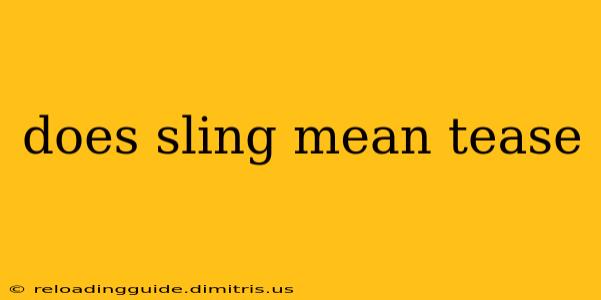Does "Sling" Mean Tease? Understanding the Nuances of "Sling"
The short answer is: not directly, but it can be used figuratively to suggest a teasing or playful interaction. The meaning of "sling" depends heavily on context. While it doesn't have a primary definition of "tease," its usage can create an implication of playful flirtation or a subtle provocation.
Let's break down the different meanings of "sling" and how it might relate to teasing:
Literal Meanings of "Sling":
-
To throw or hurl: This is the most common definition. Think of slinging a ball, slinging mud, or even slinging insults (in this case, "slinging" implies a forceful, somewhat careless delivery).
-
A type of weapon or tool: A sling is a device used to propel projectiles.
-
A strap or support: We might talk about a sling for carrying something, or a sling used to support an injured arm or leg.
Figurative Uses of "Sling" and its Relation to Teasing:
The connection between "sling" and "tease" emerges in the figurative uses of the word. When someone "slings" something, especially something intangible like words or charm, it can imply a certain effortless, perhaps even mischievous, delivery. This is where the subtle association with teasing comes in.
For example:
-
"She was slinging compliments all night." This doesn't mean she was directly teasing, but it suggests a playful, flirtatious way of showering someone with praise.
-
"He was slinging jokes around the room." This implies a casual, perhaps slightly provocative, delivery of jokes. The jokes themselves might not be teasing, but the manner of their delivery could be perceived as such.
Distinguishing "Sling" from "Tease":
It's crucial to understand that "sling" doesn't directly mean "tease." The implied teasing is dependent on the context and the surrounding words. "Tease" specifically implies an act of playful provocation designed to evoke a reaction, often a frustrated or amused one. "Sling," while it can create that impression, is a much broader term.
To be clear: If you want to express the act of teasing, using the word "tease" is far more accurate and direct. Using "sling" to convey teasing would rely on the reader or listener understanding the implied meaning based on the surrounding context. This could lead to misinterpretations.
In conclusion, while "sling" can sometimes suggest a teasing or playful interaction, it doesn't directly mean "tease." The meaning is highly contextual and relies on figurative interpretation. For clarity, always choose the word that most accurately reflects your intended meaning.

